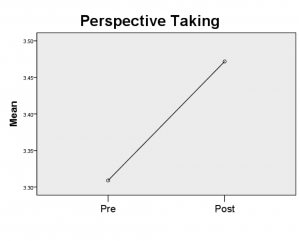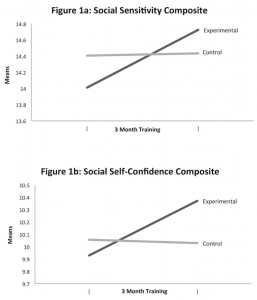Metropolitan Arts Institute, Phoenix, Arizona USA
 A small pilot study. consisting of sixty 7th and 8th graders in a local charter school. Spring 2013
A small pilot study. consisting of sixty 7th and 8th graders in a local charter school. Spring 2013
Objectives: 1) To determine whether our fifty short Social Intelligence video were engaging enough to hold the attention of the students. 2) To see if students would act upon the information by reaching out and engaging more with teachers and other students. 3) To obtain student’s written feedback on the program to use in improving and refining the program. 4) To evaluate whether the program elicited changes in empathy, perspective-taking, and loneliness as shown in pre-post self-report measures.
Each day, the school’s 7th and 8th grade science teacher showed one video followed, a written short answer reflective question and a 5-10 minute class discussion. Each student also provided written feedback on the value of the material.
Results: A review of student and teacher feedback at the end of the program revealed that the SI sessions were viewed as highly engaging and useful. Both students and the instructor were enthusiastic in their endorsement of the course. Students also commented on ways to improve each session, both in program content and method of delivery that has led to revisions in each of the 50 sessions.
Brief pre-post measures were administered; though no control condition was employed, limiting inferences concerning the effects of the program. Nevertheless, it is of interest to note differences found when making pre-post comparisons. Self-efficacy items showed evidence of improvement: “Even if relationships are hard, I can work to make them better” [F (1,43)= 4.044, p < .051]: “I have the ability to be compassionate and generous with others” [F (1,43) = 2.973, p < .10]. Perspective-taking (Davis, 1983) showed evidence of improvement for those in the 8th grade class [ t(27) = 2.033, p < .025, one-tailed], but did not improve for those in the 7th grade, suggesting a lower limit on the education and maturity level for participants to detect gains in social intelligence from the program.
 Funded by the Arizona State University College of Liberal Arts and Sciences and the Social Intelligence Institute
Funded by the Arizona State University College of Liberal Arts and Sciences and the Social Intelligence Institute
Herberger Young Scholars Academy, Phoenix, Arizona USA
A two semester study of 65 students at Herberger Young Scholars Academy (HYSA), charter school designed to meet the unique educational and social/emotional needs of gifted high school students. This study began in February 2014 and will end December 2014.
Ob jective: 1) To determine whether our 43 short Social Intelligence videos are engaging enough to hold the attention of highly gifted students, 2) to see if students act upon the information by reaching out and engaging more with teachers and other students, 3) to obtain student’s written feedback on the program to use in improving and refining the program, and 4) to evaluate whether the program elicits changes in empathy, perspective-taking, and loneliness as shown in pre-post self-report measures and self-report daily diaries.
jective: 1) To determine whether our 43 short Social Intelligence videos are engaging enough to hold the attention of highly gifted students, 2) to see if students act upon the information by reaching out and engaging more with teachers and other students, 3) to obtain student’s written feedback on the program to use in improving and refining the program, and 4) to evaluate whether the program elicits changes in empathy, perspective-taking, and loneliness as shown in pre-post self-report measures and self-report daily diaries.
Both the control group and the active participants complete pre-post self-report surveys, as well as Monday through Thursday daily diaries. Students receiving the SI curriculum complete one internet session, on their own, at a specified time each day, Monday through Thursday. On Friday, they gather into two groups to discuss the material. These Friday sessions are monitored by Herberger teachers and administrative staff, as well as Social Intelligence Institute staff.
Results: During the semester students who completed the program, they saw themselves as:

- Friendlier
- Less hostile
- More connected
- Enjoying relations with friends and family more
- More willing to take the perspective of others in their social interactions
- Better able to meet the daily goals that they set for themselves.
What we found particularly valuable was the change in student reactions to distressing relations with peers. Before students took the program, students were highly reactive to social stresses: On days they had stressful relations with friends, they were lonelier, and less able to enjoy their friendships. With our course in hand, they were less reactive to stresses they encountered, and more able to still enjoy social relations. Further, before the program took effect, social stress was associated with spikes in hostility. While taking the SI course, these negative consequences were significantly attenuated. In short, they were more resilient in the face of the social stresses, reporting that they “could bounce back from difficulties” more readily during program months.
Funded by the Arizona State University College of Liberal Arts and Sciences and the Social Intelligence Institute
Universidad Rey Juan Carlos, Madrid, Span
 A one semester study consisting of 311 students, ages 17-21, from the university’s medical school, physiotherapy, and teachers training programs. Fall 2014
A one semester study consisting of 311 students, ages 17-21, from the university’s medical school, physiotherapy, and teachers training programs. Fall 2014
Objective: To determine if key elements of social and emotional well-being change as a result of the Social Intelligence training course.
Our first large scale clinical trial took place in the fall of 2013 in Madrid, Spain. There were 311 medical school, physiotherapy, and teachers training students in the study. Results indicate that the Social Intelligence course significantly improved key indicators of social intelligence including:
 Perspective-taking
Perspective-taking- Sensitivity to the needs of others
- Social skills
- Social information processing.
- Sensitivity to others’ emotions
- Ability to modify one’s own behavior when socially appropriate
We also examined the influence of pre-existing individual differences on emotional intelligence and found that this capacity was not a prerequisite for learning/improving social intelligence.
Funded by the Social Intelligence Institute
MARC Center, Mesa, Arizona USA
 A small pilot of eleven participants consisting of both peer counselors and community members with behavior health issues. Marc Community Resources, Inc. is a private nonprofit corporation providing educational, therapeutic, rehabilitation and social services to children and adults with developmental and, physical disabilities and behavioral health challenges. Fall 2014
A small pilot of eleven participants consisting of both peer counselors and community members with behavior health issues. Marc Community Resources, Inc. is a private nonprofit corporation providing educational, therapeutic, rehabilitation and social services to children and adults with developmental and, physical disabilities and behavioral health challenges. Fall 2014
Objective: To evaluate the SI curriculum as an effective training tool for ongoing peer counselor training.
Results: Social Intelligence Training is taught every quarter to peer counselors. This is done in a workshop format
 Funded by the Arizona State University College of Liberal Arts and Sciences and the Social Intelligence Institute
Funded by the Arizona State University College of Liberal Arts and Sciences and the Social Intelligence Institute
Middle-aged adults with a history of childhood trauma
 A two-year randomized control trial of 220 middle-aged Phoenix residents. This National of Institutes of Health (NIH) funded study, awarded to Arizona State University, began in September 2014.
A two-year randomized control trial of 220 middle-aged Phoenix residents. This National of Institutes of Health (NIH) funded study, awarded to Arizona State University, began in September 2014.
Objectives: To address whether the individual differences in risk attributable to childhood adversity are reversible through our social intelligence (SI) intervention for an established cohort of community residents who were part of a comprehensive study of biopsychosocial markers of resilience at Mid-Life. We have three primary objectives in this research:
1) To examine whether our SI intervention can enhance the capacity for rewarding social relations, especially for individuals with a history of early life adversity
2) To examine evidence for our hypothesis that intervention-related gains in the quality of social relationship will be responsible for the improvements in psychological, and physical functioning, and influence two bio-markers of health risk and resilience : interleukin 6 (IL-6) and DHEA
3) To probe for individual differences in age, gender, history of abuse, personality, and genetic markers of risk that identify participants most responsive to the intervention.
To address these questions, we are delivering Social Intelligence training to a random-selected half of 220 middle-aged participants: Half with a history of child abuse and half who do not report abuse. The SI program is an on-line self-instructional series of videos with awareness exercises and behavioral practices designed to enhance fund of knowledge about relationships, increase skills, and enhance motivation to engage socially. In addition to charting social relations with daily diaries, we are assess participants’ social, psychological, and physical functioning at pre-test, post-test, three months, and six months following the intervention. We hypothesize that the SI intervention will prompt lasting improvement in the ability to establish, maintain, and benefit from social relations in comparison to controls, which will lead to better psychological and physical functioning. We will examine evidence for the hypothesis that the benefits of the intervention will be largest for individuals who have experienced greater early childhood adversity, as well as probe other individual differences in receptivity to the SI program that will inform future efforts to refine, test and disseminate this innovative program.

Funded by the National Institutes of Health, Grant #R01AG048844
The National Institutes of Health (NIH), a part of the U.S. Department of Health and Human Services, is the nation’s medical research agency—making important discoveries that improve health and save lives.





